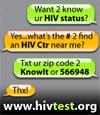National Asian and Pacific Islander HIV/AIDS Awareness Day
Transcript
May 15, 2007
May 19th is National Asian and Pacific Islander HIV/AIDS Awareness Day. A message from the office of the Surgeon General.
Hello, I’m Dr. Kenneth Moritsugu, the Acting U.S. Surgeon General.
Throughout my 36-year career in the health field, I have been aware of and involved in various programs and activities to address HIV.
I was a resident and staff medical officer at the U.S. Public Health Service Hospital in San Francisco in the very early days of HIV/AIDS over twenty-five years ago, before we even realized what we were facing.
From my home state of Hawaii to Washington DC, I have experienced firsthand the tragedies associated with this disease, the challenges in identification and treatment of individuals with HIV/AIDS, and its continuing stigma.
I have seen that AIDS can affect anyone our family members, our friends, our partners, our neighbors.
Today, more than 1 million Americans are estimated to be living with HIV--and an estimated one-fourth of them don’t even know they’re infected. The cycle of infection and illness will continue until testing becomes a routine part of healthcare.
The estimated number of Asians and Pacific Islanders living with AIDS increased more than 10% a year from 2001-2005.
As an Asian American, I know that at times cultural barriers often prevent us from talking about sexual behavior and illness. Another challenge we face is the shortage of doctors and healthcare providers who speak our languages and understand our cultural and health beliefs. For instance, many providers don’t understand that many Asian women put their family and spouses’ health above their own, waiting to seek services or care until they are sick.
We need to have more open and honest discussions about HIV prevention and treatment with our loved ones. Each time we speak about HIV it helps lessen the stigma.
In response to the crisis, The Banyan Tree Project, a national campaign to fight HIV/AIDS discrimination and stigma in Asian and Pacific Islander communities, started National Asian & Pacific Islander HIV/AIDS Awareness Day, which is held each year on May 19th.
The Project uses an image of a banyan tree to promote healthy attitudes about HIV/AIDS prevention, testing and treatment. Its branches continually shoot out new roots into the ground, symbolizing the spreading of knowledge and the acceptance of Asians and Pacific Islanders with HIV/AIDS.
We can encourage that kind of growth and play our own parts in the spread of knowledge by encouraging our family members, our friends, our partners to take an HIV test. The earlier you know you have HIV, the sooner you can access life-extending treatment and take steps to protect your partner.
We recommend that all Americans between the ages of 13 and 64 be tested for HIV as a routine part of their medical care.
We can defeat HIV/AIDS if we plant the seeds of knowledge and root out the stigma that makes people too frightened to take the test.
So Talk about HIV. Get tested for HIV. Strengthen your family tree.
Learn more about HIV prevention, testing, and treatment at www.AIDS.gov



